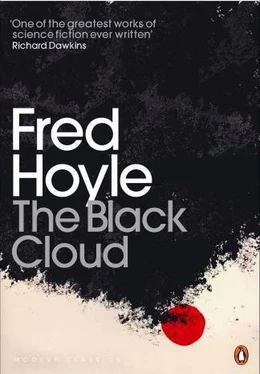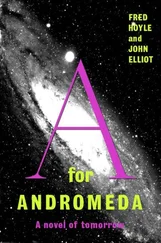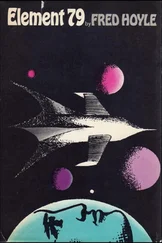Fred Hoyle - The Black Cloud
Здесь есть возможность читать онлайн «Fred Hoyle - The Black Cloud» весь текст электронной книги совершенно бесплатно (целиком полную версию без сокращений). В некоторых случаях можно слушать аудио, скачать через торрент в формате fb2 и присутствует краткое содержание. Жанр: Фантастика и фэнтези, на английском языке. Описание произведения, (предисловие) а так же отзывы посетителей доступны на портале библиотеки ЛибКат.
- Название:The Black Cloud
- Автор:
- Жанр:
- Год:неизвестен
- ISBN:нет данных
- Рейтинг книги:5 / 5. Голосов: 1
-
Избранное:Добавить в избранное
- Отзывы:
-
Ваша оценка:
- 100
- 1
- 2
- 3
- 4
- 5
The Black Cloud: краткое содержание, описание и аннотация
Предлагаем к чтению аннотацию, описание, краткое содержание или предисловие (зависит от того, что написал сам автор книги «The Black Cloud»). Если вы не нашли необходимую информацию о книге — напишите в комментариях, мы постараемся отыскать её.
The Black Cloud — читать онлайн бесплатно полную книгу (весь текст) целиком
Ниже представлен текст книги, разбитый по страницам. Система сохранения места последней прочитанной страницы, позволяет с удобством читать онлайн бесплатно книгу «The Black Cloud», без необходимости каждый раз заново искать на чём Вы остановились. Поставьте закладку, и сможете в любой момент перейти на страницу, на которой закончили чтение.
Интервал:
Закладка:
“Certainly don’t let the politicians in, Harry. Keep their throats cut. John, ask Joe how he reproduces himself ’ — from Kingsley.
“That’s what I’ve been wanting to ask,” said McNeil.
“Then carry on. Let’s see how delicate he gets when it comes to his turn.”
“Chris!”
McNeil put his question to the Cloud:
“It would be of interest to us to know how our reproductive system compares with your own case.”
“Reproduction in the sense of giving rise to a new individual proceeds in our case along entirely different lines. Barring accidents, or an overwhelming desire for self-destruction — which happens sometimes with us as with you — I can live indefinitely, you see. Therefore I am not under the necessity, as you are, of generating some new individual to take over at my death.”
“How old in fact are you?”
“Rather more than five hundred million years.”
“And was your birth, your origin, that is to say, a consequence of spontaneous chemical action, as we believe life here on the Earth to have been?”
“No, it was not. As we travel around the Galaxy we keep a look-out for suitable aggregations of material, suitable clouds in which we can plant life. We do this in rather the way that you might grow saplings from a tree. If I, for instance, were to find a suitable cloud not already endowed with life I would plant a comparatively simple neurological structure within it. This would be a structure that I myself had built, a part of myself.
“The multitude of hazards with which the spontaneous origin of intelligent life is faced is overcome by this practice. Let me take an example. Radio-active materials must be rigorously excluded from my nervous system for a reason that I explained in an earlier conversation. To ensure that this is so I possess an elaborate electromagnetic screen that serves to prevent the ingress of any radio-active gas into my neurological regions — into my brain in other words. Should this screen fail to operate, I would experience great pain and would soon die. A screen-failure is one of the possible accidents I mentioned a little while ago. The point of this example is that we can provide our “infants” both with screens and with the intelligence to operate them, whereas it would be most improbable that such screens would develop in the course of a spontaneous origin of life.”
“But it must have happened when the first member of your species arose,” suggested McNeil.
“I would not agree that there ever was a “first” member,” said the Cloud. McNeil did not understand this remark, but Kingsley and Marlowe exchanged a glance as if to say: ‘Oh-ho, there we go. That’s one in the eye for the exploding-universe boys.”
“Apart from providing such protective devices,” the Cloud went on, “we leave our “infants” free to develop as they think best. Here I must explain an important difference between us and you. The number of cells in your brain is more or less fixed at birth. Your development then consists of learning to use a brain of fixed capacity in the best possible way. With us the case is quite different. We are free to increase the capacity of our brains as we find best. And of course worn or defective parts can be removed or replaced. Thus development with us consists in extending the brain in the best way, as well as in learning to use it in the best way — by the best way I mean of course in the way best suited to the solution of problems as they arise. You will realize therefore that as “infants” we start with comparatively simple brains and as we grow older our brains become very much larger and more complicated.”
“Could you describe, in a way we could understand, how you would go about building a new part to your brain?’ asked McNeil.
“That I think I can do. First, I build chemical foods into complicated molecules of the required types. A supply of these is always kept on hand. Then the molecules are carefully laid down in an appropriate neurological structure on the surface of a solid body. The material of the body is adjusted so that its melting point is not too low — ice, for instance, would have a dangerously low melting point — and so that it is electrically a very good insulator. The outer part of the solid has also to be carefully prepared so that it will anchor the neurological material — the brain stuff as you might say — firmly in position.
“The design of the neurological structure is of course the really difficult part of the business. This is arranged so that the new brain acts as a unit for attaining some specified purpose. It is also arranged that the new unit does not come spontaneously into operation, but only when signals are received from the previously existing part of my brain. These signals have a variety of points of entry into the new structure. Likewise the output of the new unit has a host of connexions to the older part of my brain. In this way its activity can be controlled and integrated into the whole of my neurological activity.”
“There are two other points,” said McNeil. “How do you recharge your neurological material with energy? This is done in the human case by the blood supply. Do you have an equivalent to our blood supply? Secondly, what would be the rough size of the units that you build?”
The answer came:
“The size is variable according to what particular end the unit is designed for. The underlying solid may measure anything from a yard or two up to several hundred yards.
“Yes, I do have an equivalent to a blood supply. A supply of appropriate substances is maintained by a flow of gas that streams constantly past the units of which I am composed. The flow is maintained by an electromagnetic pump instead of by a “heart”, however. That is to say, the pump is of an inorganic nature. This is another facility that we always provide when we plant new life. The gas flows from the pump to a supply of chemical foods, then past my neurological structure, which absorbs the sundry materials that are required for my brain operation. These materials also deposit their waste products in the gas. The gas then makes its way back to the pump, but before it does so it passes through a filter that removes the waste products — a filter that is rather akin to your kidneys.
“There is an important advantage in my having heart, kidneys, and blood that are essentially inorganic in their mode of operation. Failure of operation can readily be allowed for. If my “heart” goes wrong I simply switch over to a spare “heart” which I always keep in readiness. If my “kidneys” go wrong I do not die as your musician Mozart did. I again switch over to spare “kidneys”. And I can make new “blood” in vast quantities.”
Shortly afterwards Joe went off the air.
“The thing which staggers me is the astonishing similarity in the principles on which life is maintained,” remarked McNeil. “The details are of course wildly different: gas instead of blood, electromagnetic heart and kidneys, and so on. But the logic of the lay-out is the same.”
“And the logic of brain-building seems to have some relation to our programming of a computer,” said Leicester.
“Did you notice that, Chris? It sounded almost like designing some new sub-routine.”
“I think the similarities are genuine. I’ve heard it said that the knee-joint of a fly is very similar in its construction to our own knee-joints. Why? Because there is just one good way to construct a knee-joint. Similarly there is just one logic, and just one way of designing the general lay-out of intelligent life.”
“But why do you think there should be this unique logic?’ McNeil asked Kingsley.
“It’s a little difficult for me to explain, because this is as near as I go to the expression of religious sentiment. We know that the Universe possesses some inner basic structure, this is what we are finding out in our science or trying to find out. We tend to give ourselves a sort of moral pat on the back when we contemplate our successes in this respect, as if to say that the Universe is following our logic. But this is surely to put the cart before the horse. It isn’t the Universe that’s following our logic, it’s we that are constructed in accordance with the logic of the Universe. And that gives what I might call a definition of intelligent life: something that reflects the basic structure of the Universe. We do, and so does Joe, and that’s why we appear to have so much in common, why we can talk together on something like a common basis, even though we’re so wildly different in our detailed construction. We’re both constructed in a way that reflects the inner pattern of the Universe.”
Читать дальшеИнтервал:
Закладка:
Похожие книги на «The Black Cloud»
Представляем Вашему вниманию похожие книги на «The Black Cloud» списком для выбора. Мы отобрали схожую по названию и смыслу литературу в надежде предоставить читателям больше вариантов отыскать новые, интересные, ещё непрочитанные произведения.
Обсуждение, отзывы о книге «The Black Cloud» и просто собственные мнения читателей. Оставьте ваши комментарии, напишите, что Вы думаете о произведении, его смысле или главных героях. Укажите что конкретно понравилось, а что нет, и почему Вы так считаете.












